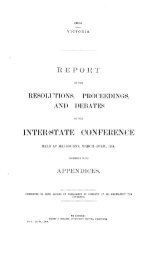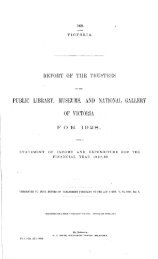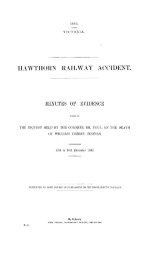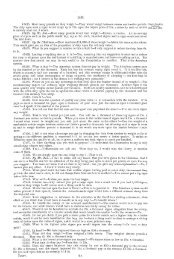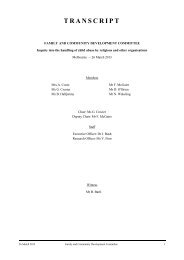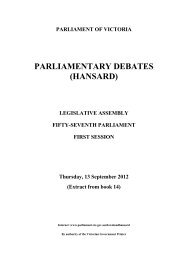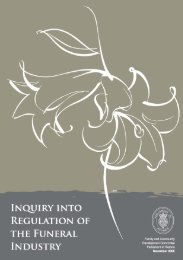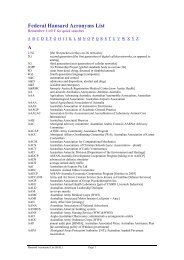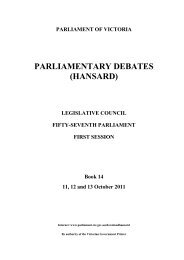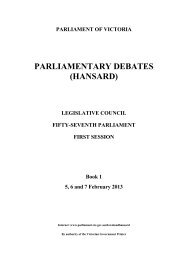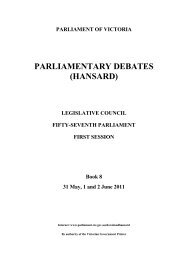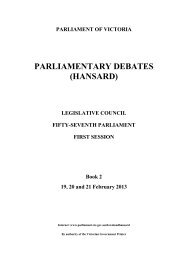Inquiry into the Road Safety Amendment (Car Doors) Bill 2012 Final ...
Inquiry into the Road Safety Amendment (Car Doors) Bill 2012 Final ...
Inquiry into the Road Safety Amendment (Car Doors) Bill 2012 Final ...
Create successful ePaper yourself
Turn your PDF publications into a flip-book with our unique Google optimized e-Paper software.
Chapter 2: Legislative framework and enforcement<br />
My view is that <strong>the</strong> police have a much more serious issue to address, and that is why<br />
<strong>the</strong>y do not take more people to <strong>the</strong> courts — because, as we know, <strong>the</strong> range of<br />
seriousness of this offence is considerable. You will hear evidence from someone who<br />
was doored who was very lucky to get away with having his life intact, and that<br />
offender only received <strong>the</strong> minimum available penalty. Nobody was taken to court in<br />
that situation … <strong>the</strong> issue for <strong>the</strong> police is for <strong>the</strong>m to explain to this committee and<br />
anybody else why <strong>the</strong>y have not more forcibly addressed <strong>the</strong> serious doorings and put<br />
more people through <strong>the</strong> courts for higher offences. I think that is really <strong>the</strong> issue for<br />
<strong>the</strong> police to address.<br />
Mr Andrew Tivendale stated: 56<br />
In my case, as I was in a coma, my partner, Courtney, was involved with <strong>the</strong> police<br />
and asked what was going to happen to <strong>the</strong> lady who doored me et cetera. It came to<br />
light that she said she had looked and so <strong>the</strong>refore <strong>the</strong> minimum penalty was imposed<br />
— whe<strong>the</strong>r she looked or not. All she had to do was to say she looked — no proof<br />
ei<strong>the</strong>r way — and <strong>the</strong>refore <strong>the</strong> minimum penalty was imposed. That does not exactly<br />
stand beside what happened to young Mr Cross, where <strong>the</strong> driver was not even<br />
interviewed. However, <strong>the</strong> fact that simply by saying she had looked, when in my mind<br />
she could not have, she gets away with <strong>the</strong> minimum penalty — I feel that is <strong>the</strong> wrong<br />
thing.<br />
In evidence to <strong>the</strong> Committee, Victoria Police indicated <strong>the</strong>y were more likely to take a matter to <strong>the</strong><br />
Magistrates’ Court where multiple offences were involved. 57 Some witnesses suggested all cases<br />
of ‘car dooring’ that involved injury should be pursued through <strong>the</strong> Magistrates’ Court. Ms Tracey<br />
Gaudry of <strong>the</strong> Amy Gillett Foundation stated: 58<br />
We would recommend that if <strong>the</strong>re is an injury, it immediately become a court imposed<br />
issue.<br />
Mr Andrew Tivendale stated: 59<br />
There is a part of me that says that any of <strong>the</strong>m where a collision occurs should go to<br />
court, and where <strong>the</strong>re is no collision <strong>the</strong>re should be an infringement notice and<br />
demerit points. However, that is unrealistic. The courts do not have time et cetera ….<br />
There is no doubt that what occurred to me was not a minimum possible offence. It<br />
was not a maximum ei<strong>the</strong>r. I do not believe <strong>the</strong>re was any malice in <strong>the</strong> action.<br />
The Committee agrees that ‘car dooring’ offences should be taken to <strong>the</strong> Magistrates’ Court and<br />
<strong>the</strong> maximum penalty pursued in certain circumstances. However, given <strong>the</strong> range of injuries that<br />
can occur from a ‘car dooring’, <strong>the</strong> Committee does not believe that requiring all incidents that<br />
involve injury to be taken before a Magistrate is <strong>the</strong> most effective way to enforce <strong>the</strong> offence.<br />
Fur<strong>the</strong>rmore, as noted in section 2.4.1, taking <strong>the</strong> matter before a Magistrate does not necessarily<br />
result in a higher penalty.<br />
Ra<strong>the</strong>r than altering <strong>the</strong> offence to prescribe situations in which <strong>the</strong> offence must be taken to Court,<br />
<strong>the</strong> Committee encourages Victoria Police to consider developing guidelines to assist police<br />
members when considering whe<strong>the</strong>r it is a appropriate to take <strong>the</strong> matter before a Magistrate.<br />
Under <strong>the</strong> Sentencing Act 1991, when sentencing an offender, <strong>the</strong> Magistrate must have regard to<br />
a number of factors, including: 60<br />
(a) <strong>the</strong> maximum penalty prescribed for <strong>the</strong> offence; and<br />
(b) current sentencing practices; and<br />
(c) <strong>the</strong> nature and gravity of <strong>the</strong> offence; and<br />
(d) <strong>the</strong> offender's culpability and degree of responsibility for <strong>the</strong> offence; and<br />
….<br />
56 Mr Andrew Tivendale, Transcript of Evidence, 23 May <strong>2012</strong>, p. 48.<br />
57 Superintendent Robert Stork, Victoria Police, Transcript of Evidence, 2 May <strong>2012</strong>, p. 22.<br />
58 Ms Tracey Gaudry, Amy Gillett Foundation, Transcript of Evidence, 23 May <strong>2012</strong>, p. 33.<br />
59 Mr Andrew Tivendale, Transcript of Evidence, 23 May <strong>2012</strong>, p. 49.<br />
60 Sentencing Act 1991, s 5(2).<br />
21



